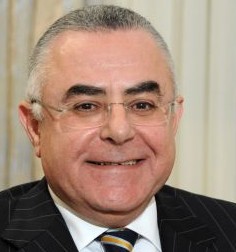Governor the Central Bank of Egypt (CBE) Hisham Ramez’s term is set to come to a close next month, but as yet, there remains uncertainty as to whether he will continue for another term or not.
Hisham Ramez took up the post of Governor of the CBE on 3 February 2013, succeeding Farouk El-Okdah, who resigned from his post in January 2013. Ramez’s term in office is expected to end on 23 November, coinciding with the end of the CBE council’s term, suggesting a complete reformation of the council.
Several indicators suggest the possibility that Ramez may leave his position, Most prominently, sources close to Ramez said he does not want to stay in office, and he would prefer to quit at this time, and not hold any public office again.
Hisham Ramez has been under pressure since he was appointed as governor, with regards to the foreign exchange market management in particular, as well as the foreign exchange reserves. Moreover, pressures = increased since the beginning of the year, following several decisions that Ramez took concerning the exchange market. These decisions were met with strong opposition by businessmen, especially importers.
Several economic organisations and bodies, including the Federation of Egyptian Chambers of Commerce (FEDCOC), objected to Ramez’s decisions, especially those relating to capping hard currency deposits at banks.
A few days ago, Ramez met with a number of CBE leaders in an unofficial setting, leading many to believe that it was his farewell gathering, sources told Daily News Egypt.
However, others have claimed Ramez will remain as governor for another term – for several reasons. The justification put forward is Ramez’s closeness to the political leadership, and their commitment to keeping him, especially in light of successes that took place during his tenure, the most important of which is his perceived professional management of the foreign exchange market and the foreign exchange reserves. Ramzez was also able to liquidate the black market for exchange while committing to repaying Egypt’s foreign debt.
According to sources, another reason to keep Ramez in charge is the lack of an alternative – at least for the current period.
Despite the rumours regarding the nomination of a number of prominent banking leaders to succeed Ramez, they remain simply rumours. Furthermore, many figures are reluctant to take leadership positions in light of the difficult circumstances Egypt is currently facing.
Nonetheless, some have alluded to the possibility of giving Mohamed Barakat, Chairman of the Union of Arab Banks (UAB) and Managing Director of the Arab International Bank, the position of Governor of the Central Bank, as he is a high-level banking professional with many years of experience, next to his international reputation that he established as the head of the UAB.
The name of Tarek Amer, former deputy governor of the CBE, is also being pushed as a potential successor. Amer is currently the Managing Director of the National Bank of Egypt’s subsidiaries in the UK.
Amer also has strong credentials for the position. He is experienced in monetary policies and exchange market management. Further, having once served as deputy of the CBE, he has many strong foreign relations.
Although Barakat and Amer are among the strongest candidates to take over, both have not received any official contacts in this regard, according to sources.




